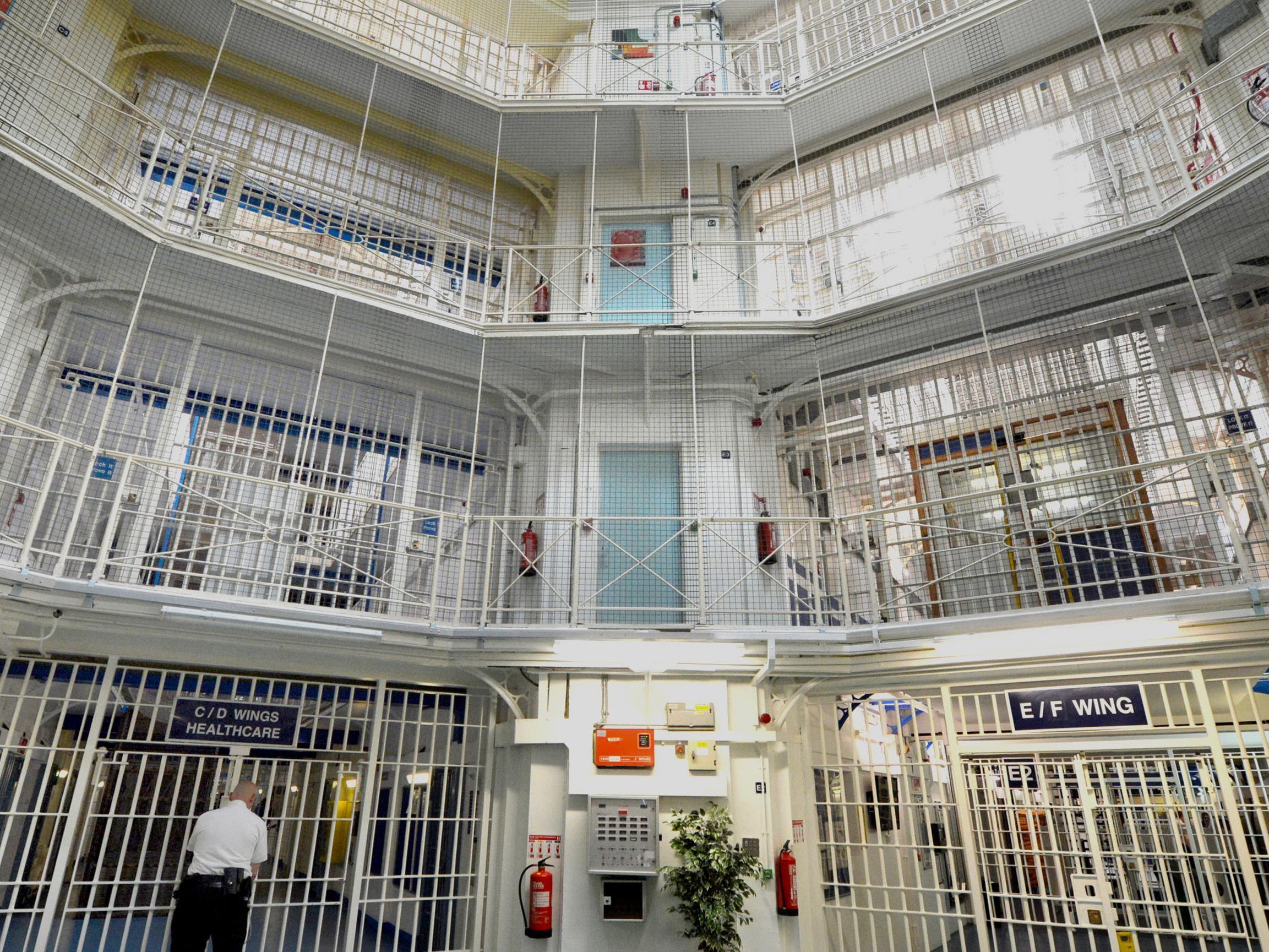When I was in prison, I thought about how a pandemic might play out for convicts. Turns out I was wrong
This piece includes descriptions of prison violence and self-harm


Your support helps us to tell the story
From reproductive rights to climate change to Big Tech, The Independent is on the ground when the story is developing. Whether it's investigating the financials of Elon Musk's pro-Trump PAC or producing our latest documentary, 'The A Word', which shines a light on the American women fighting for reproductive rights, we know how important it is to parse out the facts from the messaging.
At such a critical moment in US history, we need reporters on the ground. Your donation allows us to keep sending journalists to speak to both sides of the story.
The Independent is trusted by Americans across the entire political spectrum. And unlike many other quality news outlets, we choose not to lock Americans out of our reporting and analysis with paywalls. We believe quality journalism should be available to everyone, paid for by those who can afford it.
Your support makes all the difference.One day when I was lying on the top bunk of my bed in a cell off D-Wing in HMP Isis, South London, I wondered out loud to my cellmate: if there was some kind of fatal epidemic outside, the return of the Black Death, would we be safer here behind these thick steel doors? My cellmate, a Russian hacker who siphoned off millions from compromised bank accounts, said we would: surely if the guvs (staff) were ill they wouldn’t be allowed in? I agreed. That was one of the few upsides of being banged-up (the others being free dinner and gym passes).
We were wrong. We’re now seeing how the pandemic’s playing out in New York, on Rikers Island, where inmates have been offered $6 an hour for digging mass graves. And it’s spreading in the UK, too. On Saturday, justice secretary Robert Buckland announced up to 4,000 low-risk prisoners would be released across England and Wales in an effort to stem the outbreak.
That’s good, but I think we can do better. Historically, wars, plagues and other calamities have helped produce a fairer society: for instance, it took the First World War for women to win the right to vote. This current emergency is making us reassess a lot of things — Universal Basic Income is being pondered by Trump, of all people — so why not our justice system as well?
Seven years ago, on March 15th 2013, I was convicted in Blackfriars Crown Court of Possession with Intent to Supply Class A & B drugs (weed, coke and MDMA — basically everything you need for night out) and sentenced to two-and-a-half years. It was a massive shock to the system. I wasn’t one of those pistol-packing desperados you see on Top Boy — I was just another middle-class student selling herbal remedies to (mostly) other middle-class students. I wasn’t ready for jail time but then again, who is?
My correctional facility was to be HMP/YOI Isis; part of the same compound that houses Thameside and Belmarsh prisons, which at the time held Abu Qatada. The cells were often dirty and covered in graffiti — “3 TUBBZY”, “3 Y.J.”, “3 DA MANDEM” — and I thought about scrawling “3 ROLF HARRIS” over the walls just to mess with people’s minds.
The other convicts told me grim tales about what went on. I heard a story where a thief stole something from a gangster’s cell. The man came demanding it back, and the thief responded by throwing hot water from his kettle into the gangster’s face. The man returned with his homeboys and they rushed into his cell, closing the door behind them and turning the TV’s volume up to the max so no one would hear the screaming. They then mixed sugar with the hot water in the kettle and poured it over him before beating him till he was barely alive. The lesson here, dear children, is it’s a bad idea to steal from hardened criminals.
One of my cellmates lost his privileges when he was transferred from another prison, so he took a shaving razor and sliced open the vein on his arm in protest. He pressed the emergency bell, the one you use when you run out of toilet paper or something like that is happening, then walked up and down the cell, opening and closing the wound to make sure blood was going everywhere, before sitting down in his chair and beginning to pass out. He was wheeled out on a stretcher and held overnight in a hospital, cuffed to a bed. When asked why he did it, he said he was depressed that they wouldn’t let him have his stereo.
This all came shortly after Tory MP Chris Grayling was appointed justice secretary. He set about implementing all the usual austerity policies that Conservatives like and by 2014, ordered prison governors to slash their budgets by £149 million per year while also banning books and 18+ movies, even though some of us have already committed murderous felonies in real life and in any case were way beyond acting out Power Rangers moves in the playground. Under the reign of Darth Grayling, thousands of prison staff lost their jobs, which meant that for the last few months of my stay we were under an “emergency regime” with one half of the prison completely shutting down every other day because they didn’t have enough screws to watch everyone. This meant we sometimes were spending up to 23 and a half hours a day locked in our cells.
Though Grayling left his position at the Ministry of Justice to spread his foul odour to another branch of government, perhaps to take money from homeless orphans, the damage had been done. Spending all day and night with nothing but their own thoughts for company, some opted for an early checkout. During the time I was inside, suicides among inmates jumped by 64 per cent: from the start of 2013 to the end of summer 2014, 125 men and women took their own lives. More staff were assaulted, and in 2016 the worst riots since Strangeways erupted as cons ran wild in HMPs Bedford, Lewes and Birmingham.
The UK has the highest number of prisoners per population in western Europe, a result of “tough-on-crime” policies brought in first by the Tories and then by Labour in the 1990s. But frankly, a lot of prisoners don’t need to be there. If you’re not a violent, sexual, or violently sexual offender, along with perhaps a few other categories, there’s no reason you need to have your life taken away and thrown in a place where hopelessness, mental illness and gang culture thrive. There are other punishments available which don’t cost the taxpayer forty grand a year (the price you pay for keeping someone locked-up): for example, studies suggest fines and civil proceedings might be more useful for discouraging white-collar crooks.
Don’t get me wrong — I’ve met a few very dangerous individuals who should never be unleashed upon the public. Plus you can’t just go around burning down orphanages and expect to get away with it (some would say even the one orphanage is going too far).
But I’ve seen cellmates released only to get recalled two months later on a minor charge. I’ve seen a kid doing a two-year bird (sentence) for graffiti. I’ve seen lads serving hard time for what their friends did under joint enterprise laws, which basically means you can be prosecuted for a crime merely by being part of a group, regardless of whether or not you actually did it. This measure was supposed to be used for tackling gang violence, but actually led to locking up those who were only in the wrong place at the wrong time.
According to stats from the Ministry of Justice, one in every hundred prisoners over the past five years did time for cannabis — something that wouldn’t even register as a crime in Canada, the Netherlands and Colorado (of course you can still get nicked for weed, but generally those places are a lot more easygoing than Britain).
Other countries fare so much better. The Dutch are closing jail after jail, preferring to leave offenders at home with ankle bracelets, and the prisons they still have are so empty they’ve started renting out cell space to other countries so warders don’t lose their jobs. Norway’s prison system, which treats prisoners like human beings, has half our recidivism rate. Switzerland has managed to cut reoffending by handing out free, prescription heroin to addicts.
With the novel coronavirus, now’s the time to test novel ideas. Explore other options. Stop giving in to the tabloids’ bloodlust and lynch mob mentality. Re-examine joint enterprise cases. Address why young people mistrust police and carry knives, instead of slapping on the handcuffs straight away. End the pointless war on drugs, which has been about as effective as driving lessons from Prince Philip: my customers found another dealer in five minutes. Release all non-violent prisoners who pose no direct danger to the public.
Perhaps with Buckland’s latest move, we’ll see most of them needn’t be there in the first place.
3 DA MANDEM, indeed.
Niko Vorobyov is a government-certified (convicted) drug dealer turned writer and author of the book Dopeworld, about the international drug trade. You can follow him on Twitter @Lemmiwinks_III
Join our commenting forum
Join thought-provoking conversations, follow other Independent readers and see their replies
Comments